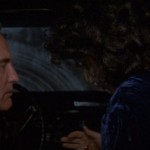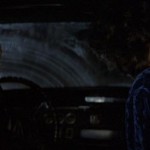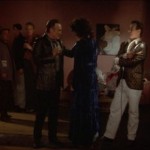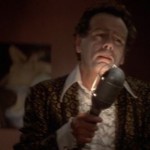Authors — Nicholas Rombes
-
THE ‘BLUE VELVET’ PROJECT, #109
Second #5123, 85:23 Knife blade at his throat, Jeffrey is silent. Has he already decided that he’ll kill Frank? Something in his face has changed. He has the weary look of someone who knows how the game will end. In one of the first great books of modern film theory, The Aesthetics and Psychology of the Cinema (1963-65), Jean Mitry traced the gradual emergence of cinema’s ability to use shots and camera movement not merely to convey narrative information but also to convey a point of view that implies some level of judgment about characters in question: Liberated from the […]
by Nicholas Rombes on May 2, 2012 -
The Blue Velvet Project, #108

Second #5076, #84:36 The car has stopped. Jeffrey and Frank and his gang are outside. Dorothy is going nuts inside the car, pleading for Frank not to hurt Jeffrey. Franks orders “In Dreams” to be played. One of the women from Ben’s apartment who’s come along for the ride, climbs on top of Frank’s black Charger and dances on the roof. In a few seconds, Frank will say to Jeffrey: Don’t be a good neighbor to her [Dorothy]. I’ll send you a love letter straight from my heart fucker! You know what a love letter is? It’s a bullet from […]
by Nicholas Rombes on Apr 30, 2012 -
The Blue Velvet Project, #107

Second #5029, 83:49 “Now it’s dark,” Frank has said previously, like some incantation, and now it really is dark. Jeffrey, his back to the camera, is practically swallowed up alive by the blackness, as Frank inhales whatever it is that unleashes his id. There is a flashlight, the dome light of the Charger, and the very small light in the distance that give shape and depth of space to the frame. For the psychoanalyst and philosopher Jacques Lacan the coherent, unified self is an illusion, a fragile thing constructed gradually during an infant’s Mirror Stage, a stage when the ego […]
by Nicholas Rombes on Apr 27, 2012 -
The Blue Velvet Project, #106

Second #4982, 83:02 This frame comes from perhaps the most difficult scene to watch—without flinching or looking away—in Blue Velvet. Frank, getting warmed up for his violent gender-bending abuse of Jeffrey, assaults what is beneath Dorothy’s robe. The viewer is trapped in the backseat with Jeffrey, sutured into his point of view. Jeffrey, who is unable to decipher the meaning of Frank. On one level, Blue Velvet is a post-apocalyptic film, where what has been destroyed is not just buildings but meaning itself. In Brian Evenson’s new novel Immobility, the main character—a paralyzed-from-the-waste-down man named Horkai—considers the devastated landscape as […]
by Nicholas Rombes on Apr 25, 2012 -
The Blue Velvet Project: A Confession

As author of The Blue Velvet Project—which owes a moral debt to the Dogme 95 movement, whose practice of constraint was an inspiration—I feel obligated to make this public statement of confessions regarding the rigors of the project. This is done in the spirit of Thomas Vinterberg’s confession regarding his film The Celebration. Despite the fact that I promised Mr. Macaulay, Filmmaker Editor-in-Chief, that I would compose each entry “well ahead of time,” I confess that the following posts were composed the day of posting: #12 #27 #28 #77 #93 I confess to posting—out of unreasonable affection for the frame […]
by Nicholas Rombes on Apr 23, 2012 -
The Blue Velvet Project, #105

Second #4935, 82:15 1. The car has come to a halt. Jeffrey’s crime has been to look at Frank, just as we also have been looking at the film itself. 2. “I shoot when I see the whites of the eyes,” Frank says at this moment, almost directing his stare at us, but not quite. This is either the statement of a psychopath or of a film director. 3. In Don DeLillo’s 1997 novel Underworld, there are these sentences: There is no space or time out here, or in here, or wherever she is. There are only connections. Everything is […]
by Nicholas Rombes on Apr 20, 2012 -
The Blue Velvet Project, #104

Second #4888, 81:28 The red, terrifying beauty of the bridge truss as Frank and his gang take Dorothy and Jeffrey on a joy ride “out to the fuckin’ country.” These shots of the truss underside, bathed in light that may as well emanate from hell, are a sort of reverse-universe visual analogy of the earlier nighttime shots of the underside of trees as Jeffrey walks down his street. In Robert Bolaño’s novel 2666, in the section “The Part about the Critics,” each of the three main characters has a different and disturbing dream on the same night: Espinoza dreamed about […]
by Nicholas Rombes on Apr 18, 2012 -
We Are All Auteurs: YouTube’s Channels of Reality
In his prescient 1967 essay “The Death of the Author,” theorist Roland Barthes celebrated the birth of the reader at the expense of the death of the author: “Once the Author is removed, the claim to decipher a text becomes quite futile. To give a text an Author is to impose a limit . . . to close the writing.” Coming during the expressive, anti-authoritarian energy of the counterculture, Barthes’ essay served as a manifesto for a democratic impulse that would transform the readers, in fact, into the creators of the text. This was also an era of radical experiments […]
by Nicholas Rombes on Apr 17, 2012 -
The Blue Velvet Project, #103

Second #4841, 80:41 1. The spell is broken. Frank has shut off the song. Ben seems insulted, and punishes Frank with silence. Dorothy refuses to smile. A joy ride is suggested. Paul’s (Jack Nance’s) shadow offers evidence of a hidden light. There is also a folded newspaper or magazine in his jacket pocket. 2. In October 1986, the month after Blue Velvet’s release, Ronald Regan delivered a speech at the Republican Governors Association Dinner. He used the word revolution numerous times, and spoke of permanently altering the balance of power: But if I could, tonight, I’d like to take a […]
by Nicholas Rombes on Apr 16, 2012 -
The Blue Velvet Project, #102

Second #4794, 79:54 The gap between Frank and Ben, and the more radical gap between the viewer and Blue Velvet. For whom does Ben sing? He begins by singing for Frank, but then he seems to lose himself in “In Dreams,” the same way that Dorothy loses herself in her rendition of “Blue Velvet.” Ben’s face at this moment registers a catastrophic loss, his secret loss, and in this frame he’s more humanized than perhaps any character in the film. His eyes look away from Frank and into something even darker. In his book The Vital Illusion, Jean Baudrillard wrote: […]
by Nicholas Rombes on Apr 13, 2012






